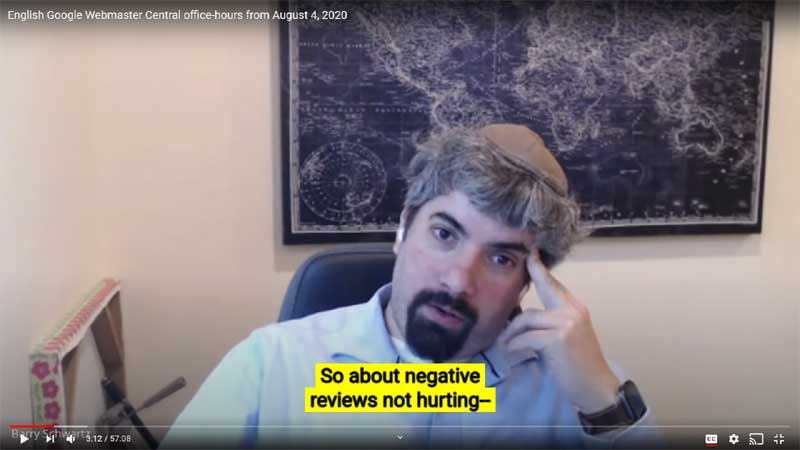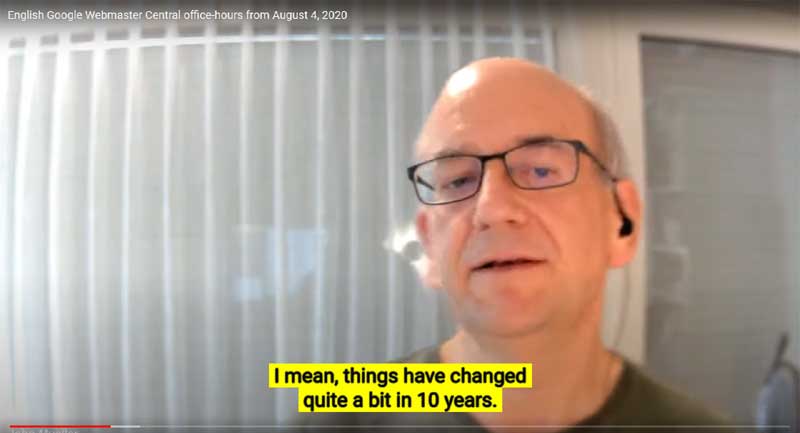05 Aug Google Explains Negative Reviews And Rankings via @martinibuster
Google’s John Mueller answered whether negative reviews harm a website’s search rankings. The answer provided useful information about how Google’s algorithms take reviews into account and the general threshold at which a negative effect begins.


This is the question that was asked:
“So, about negative reviews not hurting, so if you have a “bad” reputation online and you see a lot of negative stuff about your company.
…Would that hurt, potentially, your Google ranking for keywords?
…Could Google look at that and say, Oh this is a bad company, we’re not going to rank it as well because they have a lot of negative reviews.
You said I don’t think that would hurt overall rankings for a website if there’s a bad reputation around the site.”
Background Information on Negative Reviews and Rankings
The person asking the question also referenced a 2010 incident reported in the NYTimes where an online merchant was seemingly ranked highly because of a large amount of links pointing to their site from angry customers.
The 2010 article resulted in a response from Google (Being Bad to Your Customers is Bad for Business) that announced the introduction of sentiment analysis to “turn negative comments into negative votes.”
It was that 2010 Google blog post that is responsible for the understanding that negative reviews can harm rankings. Google’s 2010 announcement plainly said that negative comments would become negative votes.
Mueller Explains How Negative Reviews and Rankings Work
Google’s John Mueller answered the question in a straightforward manner. He affirmed that if online signals were predominantly negative then that could have an effect.
He also noted that negative reviews are common and that shouldn’t have an effect, apparently since that’s a normal thing.
This is what Mueller said:
“…That’s something where if all of the signals point in that direction, I could imagine that we might pick that up.
But if you’re talking about… there are a handful of people that are upset and they’re writing these random things online, and there are lots of people that are happy with your site, and everything is normal, then that’s not something where I would really worry about.”
I think what John might be saying between the lines there is that random negative reviews shouldn’t be seen as negative ranking factors.
The reason implied in his answer is that it’s normal to have some negative reviews.
What isn’t normal is to have predominantly negative signals.
Mueller continued:
“I think those situations where it’s like there are a lot of people that are really upset about your site, those are probably pretty rare. Not something that most normal sites would run into. “
Is 2010 Sentiment Analysis Algorithm Still Used by Google?
Mueller was then asked if the 2010 Sentiment Analysis algorithm was still used by Google.
Mueller’s answer implied that algorithms from ten years ago might not exist in similar forms since technologies constantly change.
As an example, consider the difference in your phone from ten years ago and what you carry around today.

 Google’s John Mueller commented that Google’s algorithms have changed quite a bit in ten years.
Google’s John Mueller commented that Google’s algorithms have changed quite a bit in ten years.Mueller’s answer:
“I don’t know if that specific thing from 2010 is still around. Because things change quite a bit over time.”
Later on he added this:
“…things have changed quite a bit in ten years. So that specific thing is almost certainly not there in the same way as it was back then.
…we probably take something similar into account.”
Mueller affirmed that they would act on negative reviews but that it would have to be a predominant amount of negative signals, indicating that this is more of an outlier type event.
“But that is something that we would try to pick up on. If it’s something where we see that everything is really bad about this site, that might be something that our algorithms try to pick up on.
But that’s something where in general, these kind of things because they’re so vague sometimes, really need to be really strong.
It really needs to be a strong signal for us to say, Okay, we really can trust… this problematic information and apply it appropriately for the site’s ranking.”
Mueller went on to reaffirm that a few bad reviews like any other site is normal and won’t harm a site’s rankings.
“…a case of a normal website and there are a bunch of bad reviews out there but they’re kind of embedded in the web in a normal way. And that feels like something where it’s easy to get obsessed about a handful of bad reviews.
And it’s probably not something that would drastically affect the outcome in search.”
Mueller offered a final thought on the topic.
He seemed to be saying that some algorithms don’t apply to every situation.
“I think that’s always tricky with these kind of things, to… infer from in a small situation where you are in, this applies and then to take that and say, well that applies to everything.”
The Difficulties of Extracting Sentiment From Reviews
Doing something like extracting sentiment from online reviews is difficult because there is going to be a lot of noise.
Just to give you an idea, here’s a list of factors that introduce noise into sentiment analysis for reviews (as described in a Google research paper about aggregating reviews – link at the end of this article):
1. Reviewers can be biased. Some may have an agenda. Some reviewers may be biased in favor of a competitor. Some reviewers may have been influenced by a rumor.
How can an algorithm filter for these kinds of real life biases?
2. Reviews on different sites are not all equal. Some reviews may be written by authors who have not used the product. Some reviews may have been written by professionals who have professional grade testing. Some reviews may have been written by authors with literally only minutes of product use.
How does an algorithm filter the quality of the review from different websites?
3. How are reviews graded for sentiment when the review may or may not be written with a star type rating? Does a star rating of three out of five stars mean the same thing for one reviewer that it does for another reviewer?
4. How does an algorithm define an untrustworthy review? What are the signals of an untrustworthy review?
5. Studies (cited below) have shown that existing reviews can influence the subsequent reviews, creating a polarization effect that affects the objectivity of reviews.
I can understand where John Mueller and Google are coming from when he says that everyday normal bad reviews won’t affect a site’s rankings: Reviews are a noisy signal.
It seems like situations where the overwhelming amount of signals from trustworthy sites are negative, that something like that might overcome some of the unreliability that is inherent in online reviews.
It makes sense that it would take a large amount of negative signals, presumably from trusted sources, in order to begin affecting the rankings of a website.
Citations
2010 NYTimes article about a bad business that cultivated bad reviews for better rankings
Being Bad to Your Customers is Bad for Business (Google blog post from 2010)
Star Quality: Aggregating Reviews to Rank Products and Merchants (Google research 2010 – PDF)
Sorry, the comment form is closed at this time.